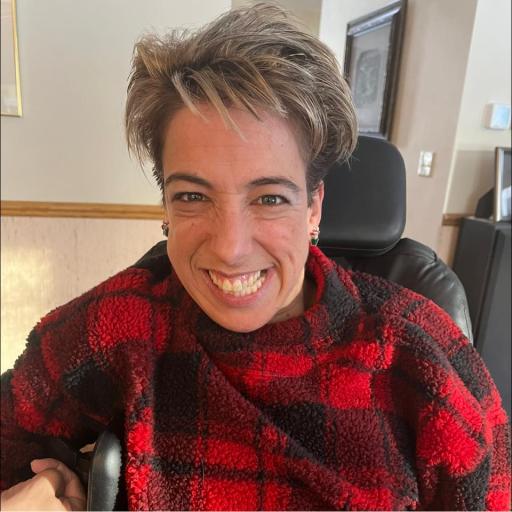
Stacy’s Journal: Misconceptions about People with Disabilities
Often times I get asked if I could have one ability that I don’t have, what would it be. Many people are surprised by my response. Sure, I’d love to walk, feed myself, take care of myself, and be able to do things like drive, but the one ability I’d love to have is to speak clearly. Most people don’t understand the impact that verbal interaction has in today’s world.
Many times people think I have a cognitive disability just because I’m in a wheelchair and can’t speak clearly. I’ve had many different augmentative communication devices over the years. Many people with speech impairments use communication devices very effectively, but, admittedly, I’ve never been one of those people. Sure, I used one for classes throughout my schooling, and I still have one for things such as presentations and events where I have to speak to strangers. I don’t use it for day-to-day communication though. There are a few reasons for this. One is because, although devices have become much more compact, having it mounted to my chair is cumbersome (I can’t pull up to my computer desk or any table with the mount on). Secondly, and probably the main reason is that speech programs take a lot of time to learn how to effectively use. Many people compare it to learning a second language. Honestly, that concept has never appealed to me. I’ve learned how to program buttons on my device for what I need to say during certain events (such as conferences and classes), but I find faster ways to spontaneously communicate. I use the speech I do have and lots of gestures. I speak in vowel sounds. For example, my sister’s name is Stephanie. I call her “et-en-nie.” It takes awhile to get used to, but if people are around me enough, they usually catch on pretty fast. If family or friends can’t understand me, they ask me yes or no questions, or I type it on the cell phone. It may take a little while, but eventually I’ll get my point across.
Without even realizing it people judge other people. We all do-it’s a normal human tendency. I’ve encountered some pretty rude people in my life. I’ve been stared and pointed at countless times in my life. Depending on where I am and who I’m with, I usually just kind of ignore it. Sometimes, when I’m with my parents or sister, they’ll say something to the person, but staring and pointing doesn’t bother me much anymore. When I was younger and was in school, kids would tease me. Kids would call me “retard” and say things that did hurt my feelings, but I learned to brush it off. Kids and adults still occasionally tease me today, but I’ve learned to take it in stride and try to overcome their negativity.
Probably what bugs me most is when people treat me like I’m deaf or I’m a baby. People talk to me in real high-pitched loud voice. I’ve gotten pats on my head, pinches on my cheeks, and even kisses on my cheeks multiple times. Again depending on where I am and who I’m with, I usually just kind of blow it off. Sometimes, if I’m with family or close friends, they’ll usually try to explain that I understand everything they say, but sometimes no matter how many times people try tell them, they still do it. Years ago, we had this elderly lady in church who came up to me every Sunday, talked to me really loud, and kissed me on the cheek. It never failed. After awhile, I just got used to it. I’ve also had people insist on giving me things such as stuffed animals and stickers when I’m out in public. I understand when people do these kinds of things that they’re trying to be nice and aren’t trying to be hurtful. That said, it does hurt inside and it’s really embarrassing—especially when out with my friends. Most of my friends are used to it now, and we just laugh it off, but it’s still embarrassing!
I realize people have misconceptions because I’m in a power wheelchair and can’t talk. I also know that I should use my communication device more to avoid some of the misconceptions, but, at the same time, today’s society should be used to differences. Whether the person has a disability or not, treat them as normal as possible. If you have a question, don’t be afraid to ask. The person with the disability would most likely have you ask it rather then having the wrong assumption be made. Don’t be afraid to say hi—- it’ll make things a lot less awkward for both of you!
Though things are improving daily for people with disabilities, some people will never fully understand that we have the capabilities to lead fairly normal lives. We, as people with disabilities, have an ongoing challenge to prove to the world that we can lead successful lives!
***The views expressed here are strictly those of the author and do not necessarily reflect those of InControl Wisconsin, the Network or any of our sponsors.
